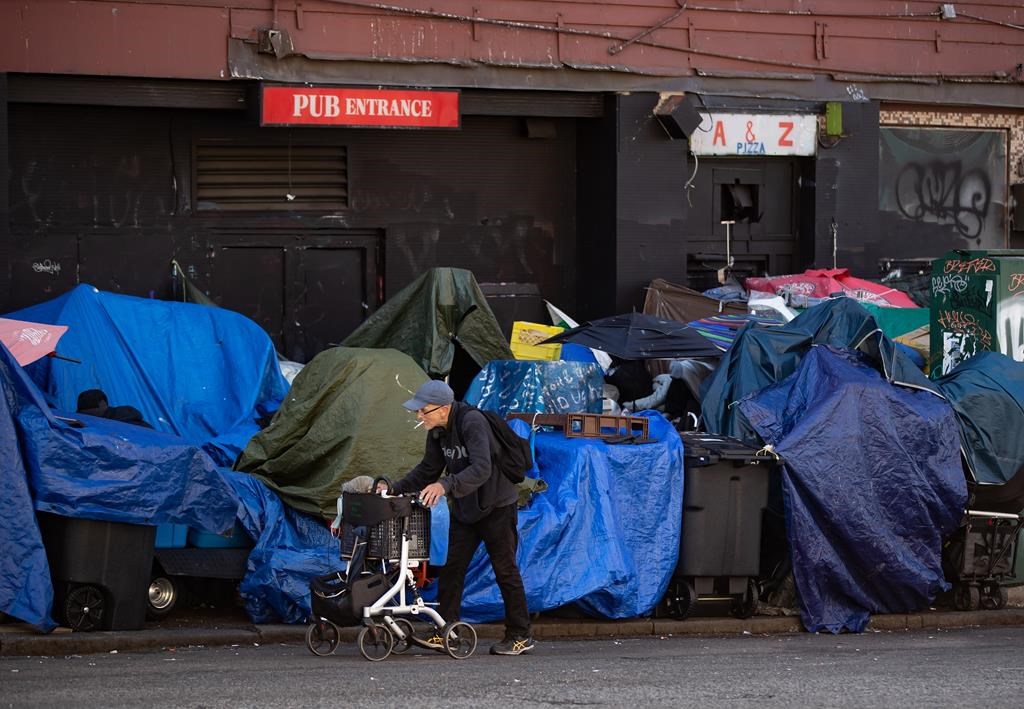Two B.C. non-profits allege human rights violations are occurring in Vancouver’s Downtown Eastside, where unhoused people residing in tent encampments may face imminent eviction from the City of Vancouver and Vancouver Police Department.

In a Tuesday submission to the federal housing advocate, the BC Civil Liberties Association and Pivot Legal Society argue that sustained efforts to “forcefully evict” people sheltering outside in the neighbourhood, coupled with government failures to provide adequate, safe and effective housing, amount to “cruel, inhuman and degrading treatment.”
“There are clear human rights standards for what constitutes adequate housing. These standards are overwhelmingly not being met by the city and the province and we stand with people who say that Hastings Street is the safest of inadequate alternatives at this time,” Pivot staff counsel Anna Cooper said in a Tuesday news release.
“Government actors need to stop gaslighting homeless people regarding the shelter they have available.”
The Office of the Federal Housing Advocate protects the right to housing in Canada with support from the Canadian Human Rights Commission.
Tuesday’s submission builds off of leaked municipal documents distributed by the Stop the Sweeps Coalition on Monday, which appear to outline a plan for removing remaining tents in the DTES. The undated presentation notes that with Vancouver police support, municipal engineering teams will “no longer disengage when tensions rise or protesters/advocates become too disruptive.”
It instructs crews to save identified “high risk zones,” where combative or aggressive behaviour has been noted, for last, and “signals an escalation in approach, in advance of larger event.” The document also instructs city Homelessness Services to intensify its outreach and encourage people to accept shelter and housing offers.

Neither the City of Vancouver nor the Vancouver Police Department responded to a request for comment on the documents and the allegations in the submission by deadline on Tuesday.
The BC Civil Liberties Association and Pivot Legal Society called on both parties to cease eviction operations in the neighbourhood, stating that “people are subjected to daily harassment, property seizures, and police violence for being without adequate housing.”

Get breaking National news
“The cumulative impact of this practice amounts to cyclical displacement, dispossession and criminalized poverty,” they wrote. “This situation is particularly compounded for Indigenous peoples, members of diaspora populations, and people with disabilities.”
The City of Vancouver began removing tent structures in the neighbourhood last summer, citing fire hazards. The municipality has repeatedly stated that advance notice, multiple warnings, daytime storage of belongings, and housing alternatives have been consistently offered to those facing eviction, but has noted modular housing is in short supply.
Some facing eviction, however, have previously told Global News the process has neither been dignified nor met their needs, with some saying life on the streets is preferable to the appalling conditions of the single-room occupancy (SRO) units they’ve been offered, and others saying they’ve been offered nothing at all.

Speaking with 980 CKNW’s The Mike Smyth Show on Tuesday, former city council candidate Sean Orr, said he was concerned by what the leaked municipal document appears to outline.
“I think it should be very concerning to all citizens of Vancouver, the kind of overreach that’s happening,” said Orr, who writes about the controversial practice of “street sweeps” in the DTES for Scout Magazine. “There is nowhere for these people to go.”
He described the decampment apparently described in the presentation as “military-style,” and noted that the United Nations Special Rapporteur on the right to adequate housing has condemned the use of police in the removal of people and possessions from the encampments in Canada.
Late last year, the provincial government took over service delivery addressing multiple crises in the DTES, including unsafe and inadequate housing, chronic poverty, the toxic drug supply and mental health and addictions challenges. Since then, Housing Minister Ravi Kahlon has said more than 90 people have moved from East Hastings Street into “safe homes.”
“Offers of indoor spaces have been made to a majority of people sheltering outside on East Hastings Street,” the Ministry of Housing said on March 26. “The number of structures along East Hastings Street has been reduced from 180 to 74 since July 2022.”
Last month, the province announced 330 new housing spaces would be coming for DTES residents by the end of June, including 241 renovated SRO units. BC Housing has not, however, revealed a plan for nearly 100 modular housing units — currently occupied — that will be shuttered and moved in July due to the end of a lease agreement.

On Monday, Premier David Eby and Kahlon announced a four-pillar plan aimed at cracking down on soaring real estate prices, increasing construction and creating more rental units.
Highlights of the ‘Homes for People’ project include a promise of legislation that allows up to four units on a single traditional housing lot, a tax on the proceeds of house-flipping, and a forgivable loan of 50 per cent of the cost of basement suite renovations, up to a maximum of $40,000 over five years, if the secondary suites are rented at below-market rate for at least five years.
In a press conference, Eby said the province is continuing to work with service providers, residents of the DTES and the city to address the “profound challenge and frankly, the deteriorating conditions in the encampments along Hastings Street.”
“It’s a profound concern to us — the fires, the assaults, the safety of the people in the encampments,” he said.
“My message to people who are living in the encampments — we have space in shelters right now, they’re much safer than the encampments. Encourage people to go inside and we’re working with the City of Vancouver to make sure there is dignified, emergency shelter available for people who are moving out of the encampment.”








Comments